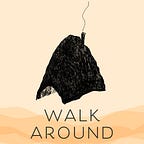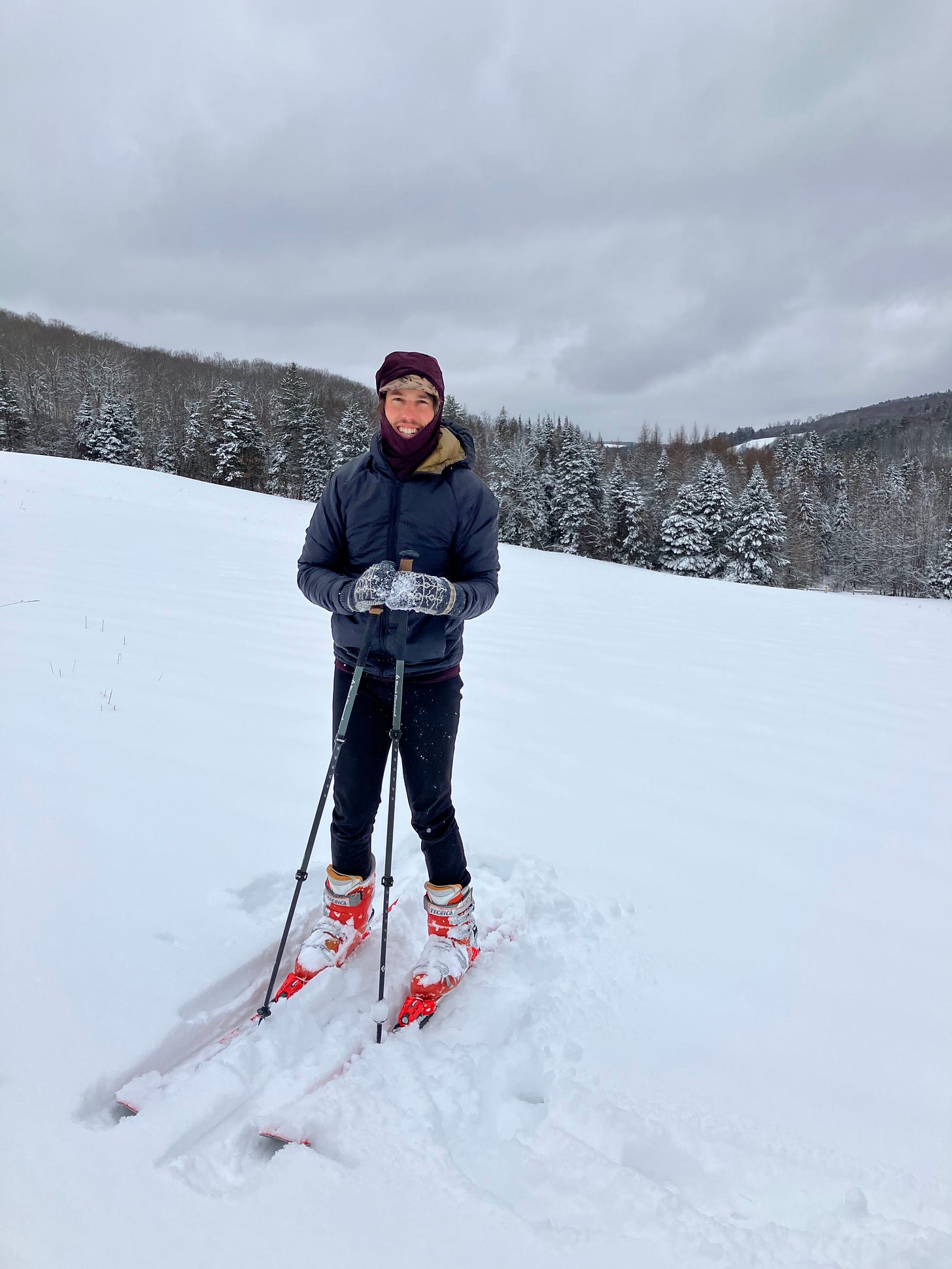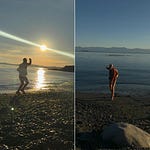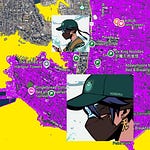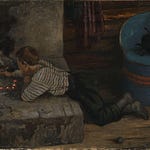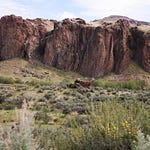Transcript
This morning I went for a run in the woods, on these really beautiful trails that are used by snowmobiles.
The organization that maintains the trails and works with landowners to allow access is called VAST - The Vermont Association of Snow Travelers.
The run goes up the hill beyond the yard and down into a field and it crosses a little road. And then it goes into some woods. The woods are pretty young, I'd say between 10 and 50 years old at the absolute maximum of the trees. There are a lot of beech trees with this canker disease, they have some yellow birch, silver birch. And a couple of maple trees, paper birch, and once in a while there's a pine tree. Kind of a scraggly woods over there.
But the trail is nice, it goes up and down following the grade of a hill. And it eventually gets to this really large field that's owned by a family called the Mudges. And they are summer people, so they aren't here right now. There, the field opens up, the view opens up to something more than you'd expect in Colorado or something. There's a split rail fence and a grove of aspen trees, and you can see a far ridge with trees on top. If you took a photo the right way, and people didn't really notice that you're surrounded by deciduous forests, you probably would think that you are in the Rockies or something.
And the magic thing about it is, besides the snowmobiles that sometimes go by, there's no one on the trail ever. Because this part of Vermont is pretty remote. It's not really close to anything, it's about an hour away from everything. And that makes it nice in some ways, but also pretty lonely.
After that I ran up a steep hill through a different set of woods, into this area that was a logging tract. It was owned by a man named Hemenway who owned a couple thousand acres of forests around here. He was a good forester type of a person. He contracted out to companies that just do very careful cutting. And so there's a lot of diversity in his woods. And he himself loved to walk in them. And there's been some memorials about him because he did such a beautiful job of preserving access and the woods themselves.
So those woods are pretty nice, they're pretty well thinned, and some pretty old trees in there that he left, probably told the loggers to leave some of the old trees, which is really good for wildlife.
It's quite a steep hill over there, and running in the snow makes it really hard. I think it's probably 500 feet vertical from the bottom to the top of it, maybe a little bit more. The whole course is around 1000 or 1200 elevation gain. I would say it's about three and a half miles one way.
I was trying to run at a pretty decent pace today. But running is always weird. I just I never know how fast I'm gonna run. Maybe it's because I have a phone that's like five years old. Doesn't really record stuff very accurately. But anyway, it was a good run.
As I was coming back down to the big field. I started thinking about something that has been on my mind for a while. Which is this experience that I had when I got a vasectomy recently. This morning I had talked to my friend Beau, who's a Chinese medicine doctor, acupuncturist and herbalist, Alexander Technique practitioner, Tai Chi practitioner, lots of different things, and I was doing a consult with him. And so something I wanted to ask him about was this experience that happened during the vasectomy that I just had. I went to the Planned Parenthood in Burlington because I've only had good experiences with Planned Parenthood. With my girlfriend's needs, different gynecological needs over the years. And everything went pretty well.
But there was this moment when I was on the table, when the nurse practitioner had cut the wrong part of some tissue, that was supposed to be the vas deferens. And the situation with this surgery is that they have to find the vas deferens by palpating them, touching them with the fingers, and then essentially using forceps or some kind of a clamp to pull them out of the pelvis.
And it's extremely traumatic.
I didn't really know that going into it. But it's like the worst pain I've ever felt, probably is like getting shot in the pelvis or getting kicked or hit with something really hard.
And so she had to do that sensation, where she grabbed the vas deferens with some kind of forceps, three times instead of just two. And it did some damage.
In the moment, what happened was I had what's called vessel vaso-vagal syncope, which means that you're fainting. It's like a state of shock. So what happened was, my hands and my feet started to go numb.
And I started to get really cold and the pulse and the pulse oximeter on my finger, which is those little clamp-clamp things that measure your pulse in your blood pressure and stuff, actually stopped working because there was no blood in the extremities anymore. It started pool in the organs. Basically what was happening is I was undergoing a shock—because I saw some indecisiveness in the nurse and I was wondering how long this procedure was going to be prolonged, because it was extremely uncomfortable. And I was wondering if she had done it right. I was wondering if she had hurt me.
I have pretty good control over my physical reactions to things. But I guess this was a little too much. And I started to kind of go into that state of fainting.
And it was really strange because the nurse and her assistants just wouldn't look at me. I think they felt embarrassed or afraid. And so they didn't look at me. They looked at the monitor. And the monitor wasn't reading anything. And so they were frustrated with the technology not showing them my vitals.
And I felt disconnected from the experience.
And I felt afraid of course.
And in the end, what helped me was to reach out and take one of the assistants hands, and squeeze it. And it felt really warm and strong.
And that's what brought me back.
The nurse had me breath some oxygen from a tank, and that didn't really seem to do anything. But squeezing the person's hand, feeling that warmth and that comfort, was really what worked. And I remember at the end standing up feeling fine. Saying something to nurse like, well, I guess this was a learning experience for all of us. Which probably wasn't the right thing to say. But I don't know, I can be kind of straightforward sometimes. And maybe she needed to be humbled a little bit. I don't know.
What I felt like when I was laying there was that I wanted to get away from the experience. Things flooded through my mind. Places that I've been, beautiful places that I've kind of left a part of myself, so to speak. Places I've hiked, camped, slept, places outside in nature, really. And it was really interesting that my mind went to this specific meadow, in the Gros Ventre wilderness, in northern Wyoming. It's extremely unused and extremely remote, even though it's close to a couple of national parks. And my mind went there to that place in that moment of fear, which I found pretty interesting.
And then, as I recovered from reflecting on that experience, I started to feel bad about myself, I actually apologized to the nurses after the procedure, because I didn't want to inconvenience them, because I felt weak.
Now, weakness comes from fear, or fear, creates weakness, or fear is part of the feeling of weakness. Anyway, they're related somehow. And I've always felt weak. I've never felt like a strong, physically strong person. And so weakness is something that I've always battled with. Athletic activities and stuff have never come naturally to me. And I never really was fast or strong, or any of those things that that men and boys are often expected to be. And so I've always felt kind of weak overall.
And so when I was laying there, and I couldn't handle the pain, seemingly, of this operation, I felt weak. And I thought I had long ago left behind that kind of feeling. Because when I first left my home, which happened to be Nebraska, I started going on trips across the country alone in my car, and I wouldn't choose the direction, except West, and I wouldn't really choose a path and make a plan. And I wouldn't really decide on campsites or anything like that. My only rule was that I didn't want to pay for camping.
And when a person is 18, or 19, or are in their early 20s, and they're pretty young and inexperienced, the world seems like kind of a scary place. At least it did to me. I had a lot of anxiety about my car breaking down, or getting lost or getting stuck somewhere, somebody yelling at me and telling me to leave or—just kind of unfounded fears that that don't make any sense, but they were there. And I've always wondered about where those fears came from. And now even though I'm perfectly comfortable with traveling like that, not paying for camping, camping wherever I find a flat space, on bike or on foot or in a car or whatever, just finding some pull off and going into the trees—my favorite kind of camping now, which used to terrify me. I used to not sleep when I did that. But that kind of a fear I thought I'd gotten over. Yet when I was on the table, experiencing that shock from the surgery kind of going wrong—I realized I hadn't. Or at least that fear still lives inside of me somewhere because I still felt weak, which is really the source of where that fear came from.
In other words, I felt bad about myself.
I felt like I wasn't good enough, or strong enough.
A friend of mine is a really good runner. I can't even explain how beautiful he looks when he runs. I've never actually seen him run in person, just videos. Which makes me sad to say. But the fact is, if we ever tried running together, he'd just completely leave me behind. So it probably wouldn't be much fun for him.
But he's the kind of person that I look up to. Because he seems so strong. I know that he's probably got his own problems. Everybody does. But it seems like he's a representative of something that I feel like I'm never really going to be that good at, which is physical strength and endurance.
I've often wondered where that damage came from.
Because if I look at my genealogical history, I've come from very strong people.
One of my grandpas lived to 92. And the only reason why he died is because he let his prostate cancer go untreated.
Another one of my grandpa's was 87 or 88, when he died, and he basically died of a broken heart because he was so difficult. He was a mountain of a man, with a laugh like a volcano.
And he was a logger. And my other grandfather was a logger as well. But then he was a farmer. And then he was an insurance salesman. At the end of his life, like probably for the last 30 or 40 years or so. They're really strong old style dudes. They knew how to do everything you needed to know how to do on a farm.
And then my dad ran many marathons. He grew up on a farm. He knows how to do everything that you need to do on a farm.
And my mom grew up on a ranch, raising horses. She knew most of what you needed to know how to do on a ranch. She also ran marathons. So I always have found it strange that I have not been as strong as my parents or grandparents.
And I've always been curious about that.
And I think that, for me, the things that I've struggled with in life have been emotional damage.
Growing up, my parents got divorced, which I had no idea—I didn't understand what was going on when I was seven, eight years old when that happened. But I can see that it influenced my growth, or inhibited my growth in a certain way now.
And it made me addicted to things to try and escape that pain.
And I think it influenced me to this day. And I think that it gave me an anxiety disorder that I've more or less taken care of—through extreme amounts of effort, and care for myself.
But it's just so interesting to see how generations of people can be changed by emotional trauma.
What that can do to someone for their entire life at least, that's what I think my legacy is.
So to stop these endless digressions, I'll just read this poem now and call it done.
The title of it is Swallows from Capistrano, and it's about my grandpa on my mom's side.
Swallows from Capistrano
He had bright blue eyes, with an old-timers folded lids
the blue that looks like cracks in a glacier, they glowed
out from his stony countenance, his bear-like laugh
filled the low room where he sat
with his wisdom about everything.
The scent of pine smoke hung even in summer
around the eaves, the fresh pine needle scent wafted too
down the hill from the hot sun, and he watched
in the spring the swallows who came back
from the eaves of the mission in far south and hot
Capistrano. My mom says she has a strange mind like him, sees
elements as part of people, the rising of fire into smoke
as a type of person, or a water-earth type, my grandpa,
he must have been a volcano under a glacier—those blue eyes
and his rumbling chest, pouring forth wisdom and love
for sitting in the sun.
Once everyone could handle him no more
he lit fires with diesel fuel and wet wood through the cold winter
and in spring
he sat and watched the swallows.
So I guess my hope is that by noticing what has hurt me, in life, I'll be able to heal certain things.
But I also don't think life is just about focusing on what's wrong.
I think it's about listening to what feels good to me.
And one of those things is being outside.
I think that's why my mind went there, when I was laying on that table, in the Planned Parenthood clinic in Burlington.
It's because that's my place of refuge.
And I'm lucky to have traveled to the places that are so unimaginably beautiful that they don't seem like they exist on the same earth as everywhere else.
And I'm also lucky to be able to find those places seemingly anywhere. It's more about how you inhabit them, maybe, then the places themselves.
My grandpa, both of them were tough guys.
Somehow, even though they sustained a lot of damage, they were very physically strong, despite all that.
I guess that kind of a damage that they got went deeper, and it changed their ability to listen.
Fortunately, I've become a pretty good listener. So now, through my running habit, I'll hopefully be able to become stronger physically too.
And heal all these things that have transpired.
Thanks for listening.


